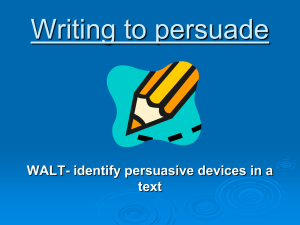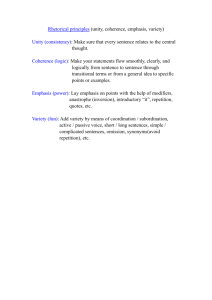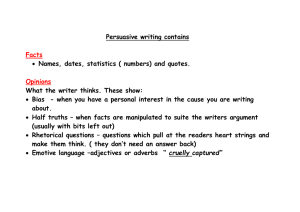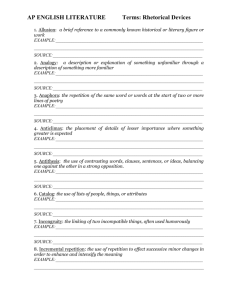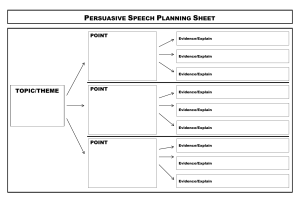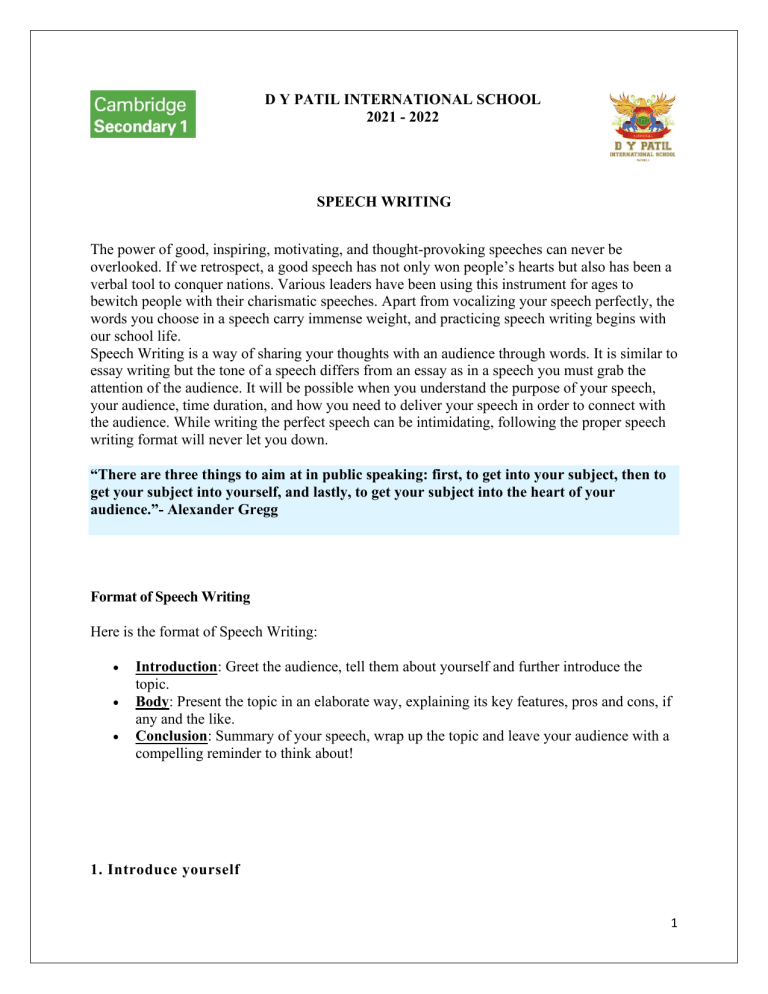
D Y PATIL INTERNATIONAL SCHOOL 2021 - 2022 SPEECH WRITING The power of good, inspiring, motivating, and thought-provoking speeches can never be overlooked. If we retrospect, a good speech has not only won people’s hearts but also has been a verbal tool to conquer nations. Various leaders have been using this instrument for ages to bewitch people with their charismatic speeches. Apart from vocalizing your speech perfectly, the words you choose in a speech carry immense weight, and practicing speech writing begins with our school life. Speech Writing is a way of sharing your thoughts with an audience through words. It is similar to essay writing but the tone of a speech differs from an essay as in a speech you must grab the attention of the audience. It will be possible when you understand the purpose of your speech, your audience, time duration, and how you need to deliver your speech in order to connect with the audience. While writing the perfect speech can be intimidating, following the proper speech writing format will never let you down. “There are three things to aim at in public speaking: first, to get into your subject, then to get your subject into yourself, and lastly, to get your subject into the heart of your audience.”- Alexander Gregg Format of Speech Writing Here is the format of Speech Writing: • • • Introduction: Greet the audience, tell them about yourself and further introduce the topic. Body: Present the topic in an elaborate way, explaining its key features, pros and cons, if any and the like. Conclusion: Summary of your speech, wrap up the topic and leave your audience with a compelling reminder to think about! 1. Introduce yourself 1 The first thing to do in any speech you write, is to introduce yourself. If you’ve seen footage of historic speeches, the speaker might skip over the formality of introducing themselves, or they might be introduced by someone before they take the stage. Put that out of your mind - for your GCSE speech, you need to make an introduction. In fact, your introduction is an opportunity. An opportunity to show your examiners that you can adapt to introduce yourself to any audience. Here’s two examples of different audiences and how you could introduce yourself appropriately: • You’re giving a speech to your teachers Because you’re talking to your teachers, in this exa mple, your introduction would need to be more formal. For instance; “Hello, and thank you for taking the time to listen. My name is Lawrence Smart, and I’m here today to talk to you about…” Notice how the speech writer in this example uses their full name and is very polite to his audience. • You’re making a speech to your classmates In this example, your language can be more casual. Your classmates already know who you are, so you could say; “Hi everyone. Most of you know me already know me - my name’s Shanice. I’m the one who always sits at the back of the class.” This speech writer is far less formal, but that’s perfect for her audience. She is speaking to her equals, and she can connect with them far more effectively by using the language they would us ually use with each other. Remember - your introduction is an opportunity. Be creative and introduce yourself to your audience with the tone you mean to go on with. 2. Make a great opening statement Now the audience know who you are, it’s time to make the m pay attention. 2 You should always begin writing your speech in a way that is catchy. You want to craft an introduction that will captivate your target audience. A good opening statement is fairly brief, but uses language techniques to make an immediate impact. To begin your speech, try using some of the following language techniques: • A rhetorical question Rhetorical questions are questions that you don’t expect your audience to answer. So why use them? Because they make your audience think. When you ask a question that your audience wants to know the answer to, they will pay attention. If you then provide an answer to your own question, your audience will be hooked. Example: “I’m here to talk to you about what ordinary people can do to fight against climate change. Why? Because we’re running out of time to act.” • A surprising statement Surprise is a powerful tool in any speech. It makes your audience sit up and pay attention. Think of the most surprising opinion or fact you want to convey in your speech. Now, use it right at the beginning. • A famous quote Before your exam, take a look at a list of famous quotes. Don’t worry about revising famous quotes before your exam: the quote itself won’t get you marks. But, if you can remember one which is relevant to your speech topic, use it. It will demonstrate your creativity and flair. Example: “As a wiser woman than me once wrote: ‘It is our choices, that show what we truly are, far more than our abilities.’” Think about how these different techniques effectively grab your attention, and remember that you can do the same with your speech. 3. Structure your speech 3 To structure your speech and make it easy for your audience to understand your point, split it into three sections: Introduction, main body, and conclusion. In each section you’re trying to achieve a different aim: • In the Introduction, your aim is to tell your audience who you are and what you’re talking about. Then, you want to grab their attention . • The main body of your speech is where you make your arguments. Divide this main body into 2-3 points, and separate each point into different paragraphs. • At the end, comes the conclusion. A good conclusion takes everything you said and sums it up. 4. Begin every paragraph with a topic sentence Because you’re dividing your speech into separate paragraphs, it’s important to make it clear what each section is about. To do that, ensure that you have topic sentences for each paragraph. For example: “Jellyfish are the second thing I want to put into Room 101, and for good reason.” 5. Use very good English Good English is essential for your examiner to give you good marks. But don’t worry, if you’re not confident, there are couple of tricks you can use to avoid making mistakes: • Avoid long sentences. Write short sentences instead. By keeping things short, you limit the amount of complex punctuation you need to use. However, bear in mind that for the top marks, examiners are looking for a range of sentence structures and punctuation. • Practice. It’s a simple tip but it’s the best one I can give you. Trying anything for the first time takes your attention away from your grammar and spelling, and that can lead to mistakes. Practice makes perfect, and it also makes you more confident. 6. Express your opinion The most common mistake students make when writing a speech is that they don’t express an opinion. 4 Opinions are the element that make a speech interesting. Whatever you are writing a speech about, express yours elf. Don’t just write about your topic, write what you think about it. What if you don’t have a strong opinion on the subject? Imagine you do, and write from that perspective. The examiner won’t care about your opinion, or whether they agree with it. What they will care about is that you are expressing an opinion in a persuasive, engaging way. 7. Write from the 1st person and engage your audience When writing your speech, always ensure that you write using the 1st person. This means, use “I” as you write. By doing this, your audience will recognise that what you’re saying is your opinion. You should also address your audience directly as if you were actually talking to them. Use “we” and “you” in your writing. For example: “I’m sure you’d all agree that...”, or “As a community, we need to…”. Using the 3rd person makes each of your audience members sit up and listen. It makes them think about how your topic and argument applies to them. 8. Use personal details and anecdotes Every good speech writer aims to make the audience relate to them. If your audience relates to you, they are far more likely to agree with what you’re saying. 5 One of the best ways to do that is to tell a short story about yourself, or provide short personal details. You don’t want to spend too much time talking about yourself and not about your argument, but small details will bring your speech to life. Here’s some examples: • In a speech about bullying, you might say: “Like it is for so many young people, bullying is a subject that is close to my heart. When I was at primary school, I was bullied and I now know how harmful it can be.” • For a speech about music, you could say: “Ever since the day I first heard Kanye West’s Runaway, I knew I’d be a lifelong fan.” • If you were talking about sport, you might say: “I was never a good rugby player. But, football? My school’s muddy, overgrown football field is where I found my true calling.” 9. Use rhetorical questions Use rhetorical questions throughout your speech, just like I suggested you should do in your opening. Remember: rhetorical questions grab your audience’s (and your examiner’s) attention. But, don’t use too many questions, or you’ll begin to sound like you don’t know what you’re talking about! A good rule of thumb is to use 2 -3 rhetorical questions in throughout your speech, each in different paragraphs. 10. Use emotive language Emotive language is one of the most basic, but most effective tools a speech writer can use. In your speech, things shouldn’t simply be described just as “good” or “bad”. They should be “fantastic” or “horrible”, “pure” or “corrupted”, “exciting” or “disappointing”. Notice how these example words express more than just “good” or “bad”, they also add other flavours to your description. But, be careful not to over-use emotive language. If you go go over the top it can reduce the effectiveness of all of your words. Use emotive words sparingly throughout your speech. Using the 3rd person makes each of your audience members sit up and listen. It makes them think about how your topic and argumen t applies to them 6 11. Use figurative language As with emotive language, this shouldn’t be over -used. But, used sparingly, figurative language creates powerful images in your audience’s mind. There are many types of figurative language, but these are the main ones you should focus on using in your speech: • Simile - Describing something to be like something else. For instance, “She has eyes like a hawk”, “He’s thin as a twig”, or “They’re fighting like cats and dogs”. • Metaphor - Describing something by using a word that isn’t literally relevant. For example, “It’s raining men”, “I’m feeling blue”, or “The weather was bitterly cold”. • Imagery - Using words to make you imagine how they would affect your senses. For example; “A sweet apple”, “A sharp pin”, or “The lion roared”. 12. Use contrast Contrast is a powerful technique. It highlights your point because of the clash of imagery it creates in the audience’s mind. You can exploit this by using contrasting words and phrases in your sentences. For instance; “I love writing, but I hate writing essays”. You can also bring added flavour to your figurative language, by using contrasting imagery. For example, you could describe one person as a “fiery and passionate” and another as “cold-hearted”. 13. Use repetition Repetition is for emphasis. Repetition is memorable. Repetition is one of many persuasive techniques which will help you get a good grade. As I’ve just done, starting consecutive sentences with the same word is a very effective technique. 7 Repetition can also be used for key phrases in your introduction and conclusion to bring your speech full circle. For instance, if you started your speech by saying “The pen is mightier than the sword”, repeat that phrase in the conclusion to your speech. 14. Use the list of three We don’t know exactly why, but the human brain easily remembers things in threes. Use this to your advantage. When you’re using a list of adjectives to describe something, use three. When you’re A very common technique is to combine repetition with the list of thr ee. By repeating a word three times in consecutive sentences, you can make a very compelling point. 15. Focus on the topic When writing a speech in an English exam, always stay focused on the topic you have been asked to write about. Never derail from the subject of the speech you are writing. This will make you lose marks. This is why it is so important to plan your speech before you begin writing it. Think through the structure you are going to use and stick to it. That way, you’ll stay on topic and your argument will be focused. P-ersonal anecdotes to bring your speech to life E-motive language to persuade your audience. R-hetorical questions to make your audience listen. F-igurative language such as metaphors and similes. E-mphasis through repetition and the rule of three. C-omparison and contrast to make your points clear. T-one of voice that is relevant and persuasive for your specific audience. Speech Writing samples: 1.I am here to tell you that life upholds many challenges for us to fight or accept defeat. In our daily lives as students, teachers, workers, and even on the basic level as mere individuals, we are faced with problem after problem, some of which may be too much for us to endure. Starting from simple problems like indecisiveness on what to wear going all the way to life -threatening hurdles, our responses to situations are more or less the same – we panic at the slightest of things 8 and find it impossible to keep steady in grave and serous circumstances. But how many of us assembled here today actually stand up to our challenges and fight our way up again? How many of us actually resolve our problems instead of sulking and giving up? How many of us actually make lemonade from the lemons life throws at us? A very good morning to one and all present here. I am Alison Wright and I’m honoured to be able to deliver this speech today in this esteemed gathering. My life ever since the past decade had been full of struggles, that too merely for survival. A bus accident that took place in January of 2000 left me devastated, both physically and mentally. Lying there with nothing but broken limbs and blood oozing out of my shredded body, on the verge of death, I was reminded of my past memories. The countless lessons of Vipassana meditation aided me in focusing on my breath and holding put till a kind passerby arranged for my admission in a proper hospital. Returning home and consulting the doctors was strenous to say the least. Wherever I would go, the feedback was – “your life will never be the same”. Although the hopes were seemingly less, I nevertheless gathered my courage and forced myself out of this adversity. After spending four torturous months in bed, rebuilding my muscles from scratch was no child’s play and neither was doing a thousand situps a day. Everyday day that I managed to wake up was a blessing. Every time I could step foot on the ground would feel like a dream come true and would fill me with gratitude. After what seemed like ages, I was able to overcome my depression and my other physical and mental maladies. Taking up a goal of climbing Mount Kilimanjaro, I began preparing hard to achieve it. Finally, in 2004, I accomplished my goal by touching the peak of the majestic mountain. Dear students, life is a battle we are all forced to fight. Our enemies may not be, but changing our victory to defeat and defeat to victory is definitely in our hands. With powerful weapons like gratitude, courage and determination, we can win this battle and thereby win against the perpetual struggle of existence we all are going through, almost on a daily basis. Today, let’s make use of the beautiful gifts god has given and follow the saying” When life gives you lemons; squeeze them in life’s eyes” 2.You are the Head Guide, Chris (Peter’s boss). You are responsible for training the safari guides. When a group of new trainee guides arrives at the camp, you give a talk to prepare them for what lies ahead. Write the words of your talk. In your talk, you should: • describe the range of attractions Idube Camp and the area around it have to offer and how these might appeal to guests • explain what being a trainee guide is like – the kind of activities they will be asked to do and what they should and should not do as trainees • suggest what makes a good safari guide, the challenges of the job and the personal qualities they will need to develop. 9 Welcome to Idube Camp! I hope you are excited for the new experience of the camp. There are many exciting things ready for you to explore, one of them is the safari drives where you can see dangerous animals in their habitat and how they interact with each other. Secondly, there will be guided walks where the safari guides will explain the surroundings and tell what you missed during the walk. Lastly, there are dinner nights with delicious food and service with socializing under the starlight. The place is decorated with lanterns. Being a trainee guide, one should remain calm at all times. You should always be the ones to lead the group. Trainees are also required to carry liquid drinks to Bush Camp. My advice to you is to never run whatever you do. Try to never forget this point as it is essential and crucial. What makes a good safari guide are the little things which are often overlooked. The in-depth knowledge of trees, birds and insects will help you. You should also be aware of taking shortcuts and changing paths when required. There are also some challenges guides should overcome first of all, carrying cans when they happen to let go of the wheelbarrow. It is also important to know the different bird calls to know whether they are alarm calls against predators or you. This will help you in navigation and protection. So, I hope you are excited to begin this journey with us. We welcome you to Camp Idube with all our hearts! Thank you! 10
